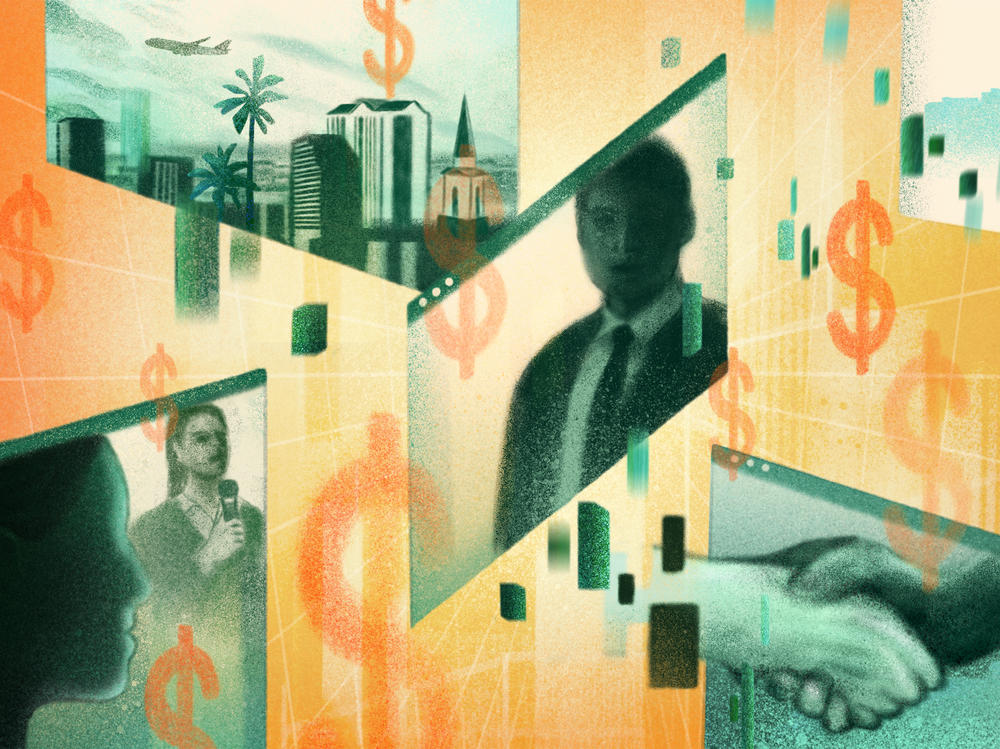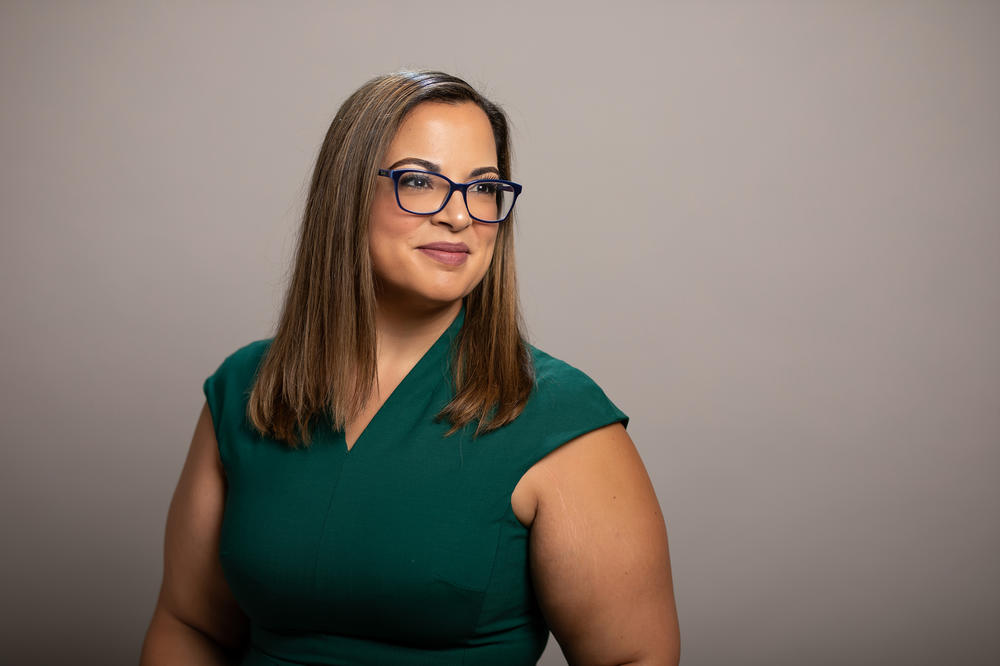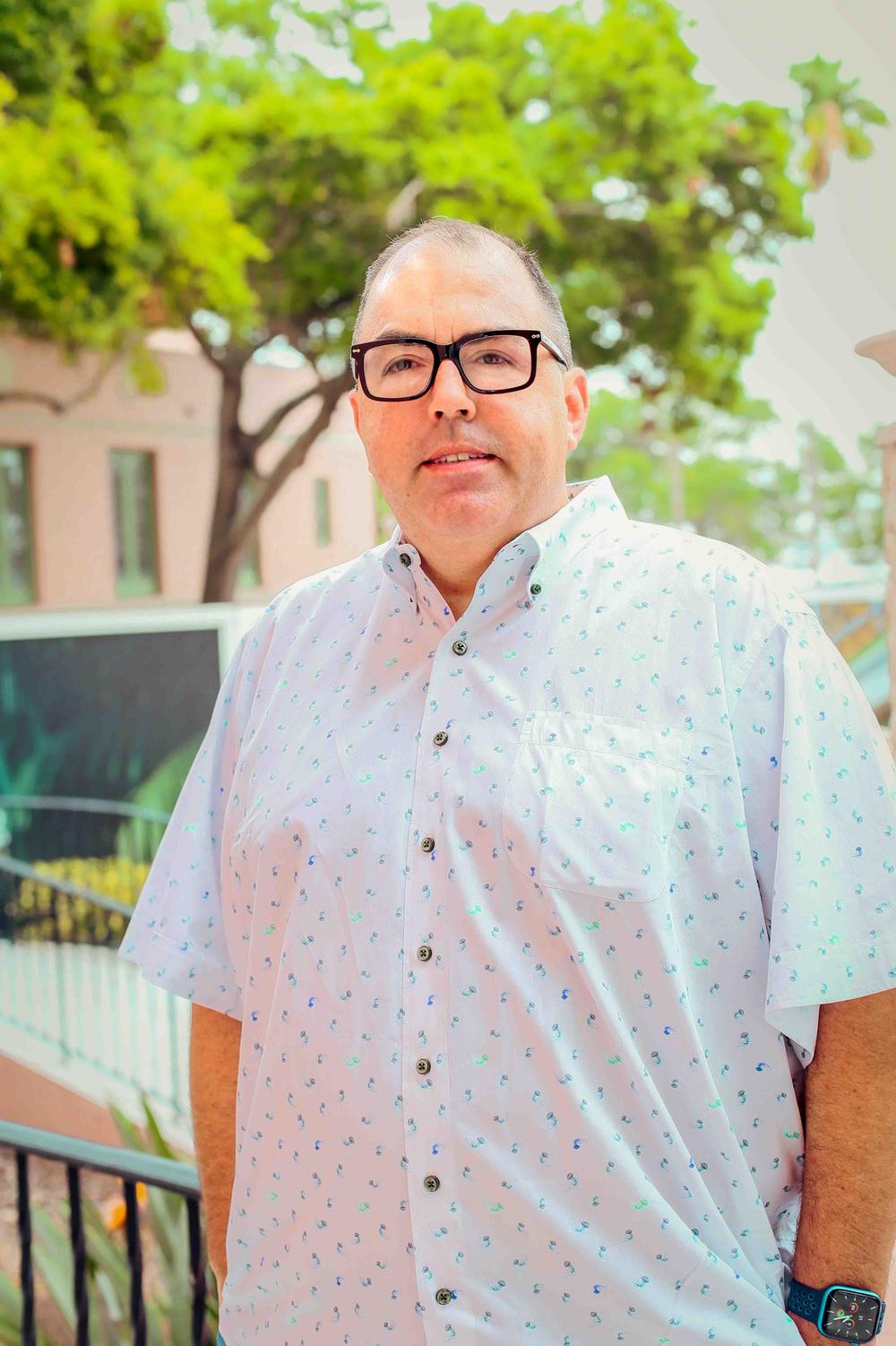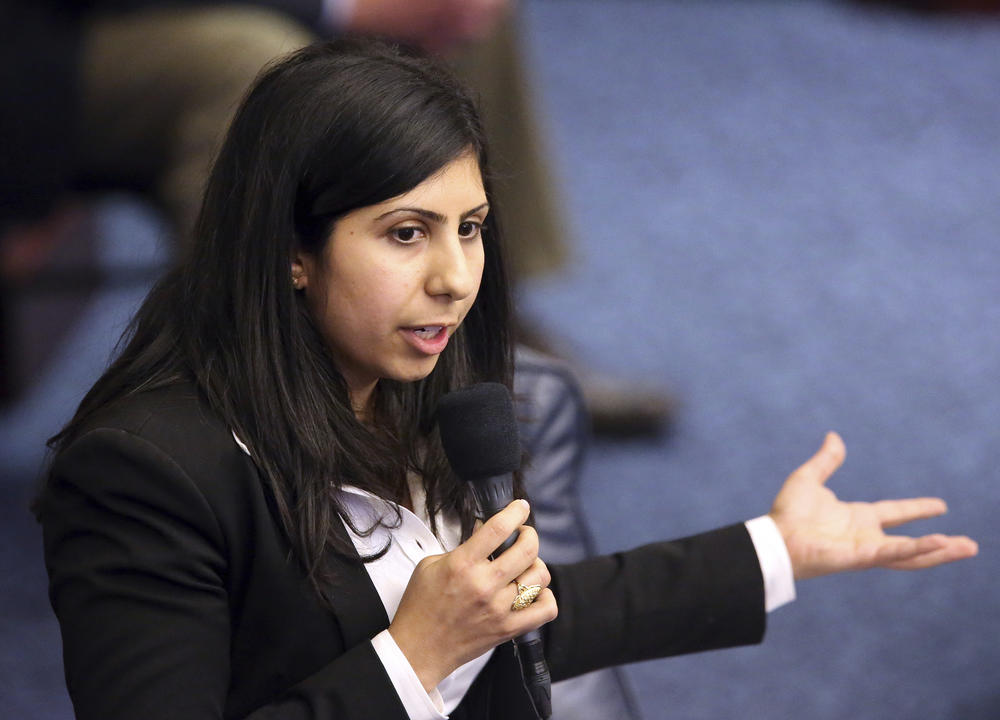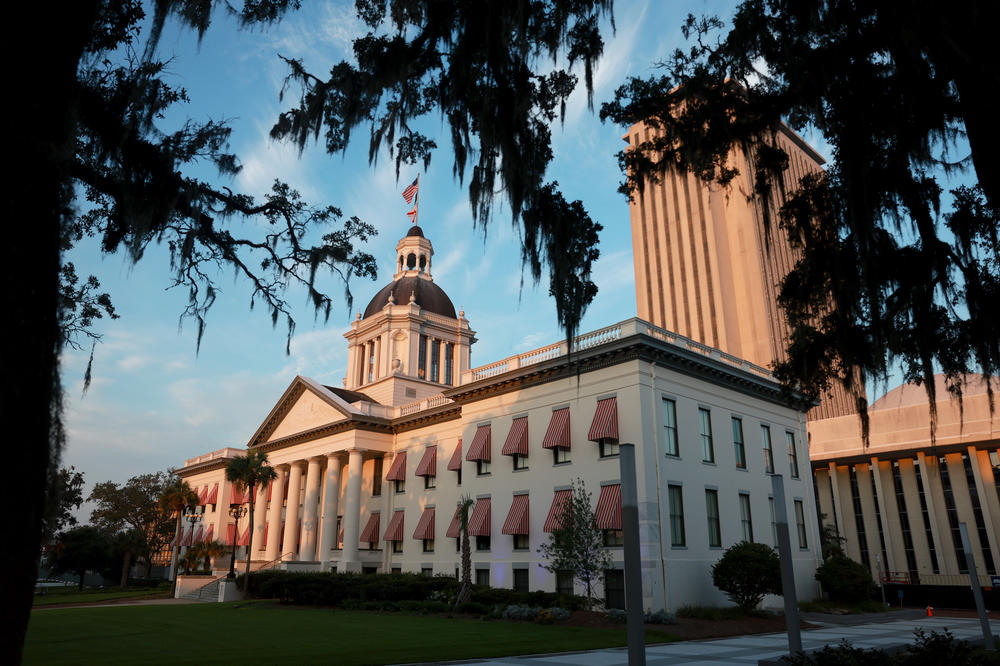Section Branding
Header Content
Politicians say this Florida news site lets them buy coverage. Is your state next?
Primary Content
This story was reported by NPR's David Folkenflik and Miranda Green of Floodlight, a nonprofit newsroom that investigates the powerful interests stalling climate action.
Political strategist Eunic Epstein-Ortiz arrived in Florida from New York in 2017 to help a major labor union turn out voters for the following year. She recalls being pleasantly surprised by the positive coverage the campaign received from Florida Politics.
The website is Florida's answer to Politico: It illuminates developments on politics and policy for insiders and news buffs, and it influences what other outlets report about the state. And it reflects the drive of its founder, Peter Schorsch.
"He will determine whether or not something is news in the state of Florida," Epstein-Ortiz says.
By her telling, her pleasure soon curdled. Schorsch emailed to ask the union to buy advertising on the site. She declined, as the union was not seeking to reach the website's core audience of state lobbyists and political professionals. And then the site abruptly stopped covering the union's campaign. (Another former union official confirms her account.)
"He's only covering the story if you've written a check," Epstein-Ortiz says.
When Epstein-Ortiz ran as a candidate for the Florida Senate last year, she says, consultants told her to pay Schorsch for advertising so she could be sure of coverage in Florida Politics. She needed the credibility with potential donors who track politics closely, they said. And so she paid $2,750 to her consultants, who placed ads with Florida Politics the day after reaching an agreement with Schorsch on an advertising package, records show. (A person with direct contemporaneous knowledge confirms her version of events.)
"Everything changed almost overnight," Epstein-Ortiz says, saying the coverage ramped up from zero to 60. Among the ensuing headlines: "Eunic Ortiz vows to 'stand up to corporations'" and "Eunic Ortiz garners endorsements from 11 state lawmakers."
Epstein-Ortiz labeled what he does "pay-to-play" on X, previously called Twitter, much to Schorsch's anger, though she did not name him or his site. Schorsch rejects Epstein-Ortiz's version of events. He says neither her campaign's payments nor the lack of payment by the union influenced his coverage.
Favoring advertisers and friends
Schorsch says he considers the "pay-to-play" label a smear and denies that he does it.
Even so, Schorsch acknowledges that outfits that advertise with his properties get more attention. And he concedes that he focuses more coverage on lobbyists, campaigns, causes and corporations when friends are involved. "I still have very strong strategic business relationships with people. That opens doors, provides revenues."
"That still generates a level of discomfort with ... legacy media people," he tells NPR and Floodlight.
This story is based on interviews with more than two dozen people, including current and former state officials, political consultants, lobbyists and journalists.
Four former Florida Politics journalists say Schorsch repeatedly distorted coverage at the behest of corporate interests and political campaigns. He was not shy about such arrangements, associates say.
Schorsch makes no apologies for his business model, calling it "combination journalism."
"As things evolved, I started to accept some of the rules of journalism, of the business of journalism," Schorsch says. "And some of them I didn't."
For example, correspondence obtained by NPR and Floodlight shows Florida Politics invites candidates to pay for content about campaign activities like endorsements or fundraising. A review found that Florida Politics does not label the content as advertisements.
"I don't think I've ever held myself up as a journalist. I've said that I'm a publisher, that I publish the work of other journalists," Schorsch says. "There are still gray areas that I get into."
Reputable news organizations have policies that explicitly bar favoring friends or advertisers in their coverage. He says his approach evolved organically from his start as a solo political blogger two decades ago.
"We're setting new rules," Schorsch says. "We're very much a niche property that attracts advertising and sponsorship and partnership arrangements with people with whom we interact with, if not cover."
Sometimes those relationships become adversarial, he says. "They still want to reach the people who are reading our coverage," Schorsch says, "because we're one of the last media outlets that's devoted to full-time coverage of the Florida political process, especially the legislative and governing process."
Rising as Florida newsrooms shrink
Schorsch has ascended as the state's newsrooms have withered and their reporting ambitions have narrowed, even while they publish award-winning accountability journalism. Just this week, the Miami Herald's state Capitol bureau chief, Mary Ellen Klas, announced she was leaving for Bloomberg Opinion, though she will be replaced. She has co-led a bureau run jointly with the Tampa Bay Times. The two publications used to compete muscularly against each other and numerous other state papers.
Popular stories on Florida Politics routinely top 100,000 readers, according to Critical Mention, a digital traffic monitoring service. It regularly breaks news involving the rhythms and power centers of state politics, as well as shifts in policies. Schorsch's company, Extensive Enterprises Media, also owns other news sites, email newsletters and a magazine. It tracks the ups and downs of lobbyists and industry officials who help run the Capitol.
Schorsch himself has become a character on the political scene, almost uniformly viewed as a charmer, a raconteur and a shrewd analyst. Schorsch was one of the first to argue that Florida Gov. Ron DeSantis would fail to take flight in the Republican presidential primaries.
Schorsch now seeks to reproduce his success in Florida in nine other states — Alabama, Arkansas, Georgia, Kentucky, Tennessee, Texas, Virginia and the Carolinas — under the title he launched in 2022, Southeast Politics.
Many people to whom NPR and Floodlight spoke praise the news coverage that Schorsch offers but say the way he does it chips away at its credibility.
"The Tallahassee press corps got smaller, smaller, smaller. He identified that gap and really has filled it up," says Florida state Rep. Anna Eskamani, a Democrat. She paid $2,250 in 2017, according to disclosure forms, which went for banner ads on the Florida Politics website.
Over time, she says, she found Schorsch's model "really, really scary."
"When you can't decipher what's actual news, right, compared to what's someone's editorial, or what's rumor, then it really erodes democracy," Eskamani says. She stopped advertising.
One Republican lawmaker who paid Schorsch for coverage says the publisher offered to change stories after they were published, as long as he continued advertising.
Schorsch says he has no recollection of making any such offer, saying instead that he makes minor changes when he concludes an element had been unfair.
The Republican lawmaker spoke on condition of anonymity, citing fears that Schorsch would target him in stories. Schorsch has lashed out at people who criticize him and closely monitors what's said about him on social media. In one instance, he threatened to do whatever was legally possible to ruin a critic, in a text to the critic reviewed by NPR and Floodlight.
Asked about making that threat, Schorsch says, "I'm a teddy bear and I don't hold grudges. That said, I will absolutely go to the full extent possible to protect my enterprises. It's like the line from Untouchables from [David] Mamet: Come at me with a knife, I'm going to go with a gun."
"I take everything very personally," he adds.
Leaving readers in the dark
Schorsch directly seeks advertising revenues from those he covers.
"You always knew when he had a boat ride — presumably a cruise — coming up, because he'd hit you up for money," says the Republican lawmaker cited above, who says he pays Schorsch for advertising to stay on his good side.
In May, Schorsch promoted a "memorial day weekend sale" knocking $1,000 off the cost of a $5,000 package for "rotated ads on the site, plus native content about key endorsements and fundraising," texts show.
Paid or "native" content refers to pieces paid for by sponsors that are designed to look like independently reported stories. Established newsrooms clearly label them as paid advertisements because of ethical and legal concerns. Schorsch's publications do not flag such articles that way. In an interview, Schorsch said he does not see that absence of disclosure as a lack of transparency.
In September, in another text blasted to advertisers, Schorsch opened a pitch with a joke. "No, I am not going on a cruise," he wrote, adding, "it's time to talk ad rates."
At least 157 politicians and dozens of political action committees have paid Extensive Enterprises Media, Schorsch's company, nearly $900,000 since 2010 for a mix of services that include digital advertising, consulting and web development, public records show. That likely deeply understates the level of spending, as consultants and private groups are not required to list expenditures publicly. Schorsch says he generates between $2.5 million and $3 million annually, overwhelmingly from advertising and sponsorship. He says he also receives fees from investors and other business groups to give talks on Florida politics and policy.
Schorsch is a registered Republican, but his partisan identity comes from a different era. Early in his career, Schorsch worked for Democrats as well as Republicans as a political consultant. He says he loves former governor and former U.S. Rep. Charlie Crist, a Republican turned Democrat, "like a brother." (Schorsch's wife worked for Crist when he was governor.)
Politicians who advertise with Schorsch span the spectrum
The politicians who have advertised in Schorsch's outlets span the spectrum from liberal Democrats to pro-Trump and pro-DeSantis Republicans. Former GOP state Sen. Jeff Brandes was one of Schorsch's biggest clients. Brandes and his political action committee paid $178,000 over seven years to Extensive Enterprises. Brandes characterizes the coverage that ensued as paid content, advertising that takes on the look of news.
"You're doing it to be noticed by people who are helping support and promote your campaign," says Brandes, who says he considers Schorsch a friend. "When your coverage says, 'Jeff Brandes raised $100,000 this month. His opponent raised [$40,000],' that shows momentum. And the Tampa Bay Times is not going to cover that."
In interviews, Schorsch says he believes such stories are useful, though he sidesteps whether they represent paid content. He has devoted numerous recent columns to developments at Tampa Electric, with stories that herald its new jobs training program at a community college, its effort to insulate infrastructure from storms and its drive to build up renewable energy. His pieces cite no outside voices, contextual assessments or critical perspectives.
Schorsch confirms that the power company, dubbed Teco, pays $20,000 annually to advertise on his sites. He says its new chief lobbyist, Stephanie Smith, is a friend.
"I write more often about them because my family's best friend works there," Schorsch says. "If it's upsetting that we write it, that I write a story about Teco donating some backpacks or whatnot about their charitable activities, then again, I am guilty of that."
Almost every major news organization disavows publishing paid content that is not publicly disclosed. Candidates for federal office risk violating the law if they do not disclose paid advertisements on cable news and online outlets. There are no such laws in Florida for state races, lawyers say.
"A lot of grift"
Newspapers in Florida have undergone waves of cuts in recent years. Schorsch jokes that he runs "a halfway house for laid-off journalists."
"We've changed the nature of the game here in terms of partisan media, in terms of media getting engaged by people," Schorsch says. "A lot of the old rules no longer apply. So we're setting new rules."
Political professionals say paying for coverage at Florida Politics is the cost of doing business — without it, they can't communicate their seriousness to potential donors or partners.
Journalists say it's an affront.
"That's not journalism, but it is masking itself as journalism," says Neil Brown, who was the editor-in-chief of the Tampa Bay Times when it investigated Schorsch over similar concerns a decade ago. "And I think that is problematic for democracy."
Tracey McManus, a Tampa Bay Times reporter, accused Schorsch of "ethical bankruptcy." Veteran Florida journalist Marc Caputo, now a political reporter for The Messenger, has a terse verdict on Florida Politics: "There's a lot of grift that's happening there."
The media landscape in Florida is changing. Much has been written about two of Florida's emerging news sites, Florida's Voice and the Florida Standard, both founded by conservative activists. While DeSantis largely ignores or demeans the state's established news outlets, these newer ones often amplify his talking points and receive his attention. Evidence presented in court has shown close coordination between the governor's office and the Florida Standard on stories damaging to his political targets.
Building his empire
In August 2022, Schorsch leaped onto the national scene by breaking the news that FBI agents had descended on former President Donald Trump's Mar-a-Lago estate.
"Humbly, I think I know Florida politics," Schorsch says.
Schorsch seeks to replicate his success through Southeast Politics.
An early advertiser is the Energy Institute of Alabama. It is linked to regional energy companies and a dark money group operated by a consulting firm called Matrix LLC that secretly funded other pro-business websites. One of Matrix's former clients, the utility Florida Power & Light, is an advertiser on Florida Politics; it paid $43,000 to Schorsch in 2021, according to an invoice he shared.
The new site relies heavily on Florida Politics or articles syndicated from The Associated Press.
Political ventures, legal potholes
Schorsch's career had a rocky start, replete with legal clashes, criminal charges and political scandals.
Schorsch, now 47, started out as a political consultant in the late 1990s and set up his own shop in 2003. Troubles soon followed. In one instance, he was accused of dirty tricks. Schorsch said the candidate he had worked for was the one behaving unprofessionally.
Authorities charged Schorsch with writing 16 worthless checks and cited him for failure to pay rent. Schorsch says now that he wrote the checks to a grocery store to pay debts, fed by a gambling addiction that spiraled out of control as his father was dying. Clients complained his checks bounced for services.
A few years later, Schorsch pleaded no contest to felony charges — fraud and two counts of grand theft — for stealing money from clients. He was sentenced to two years of house arrest. After several months, he paid off his debts, and the judge released him from the rest of his sentence.
In 2006, the Florida Elections Commission fined him nearly $68,000 for 40 counts of "willfully" violating the election code. At the time, Schorsch said he would never pay the fines, saying the transgressions did not amount to crimes. (Thanks to the interest being levied, the balance owed has ticked up to more than $350,000.) Schorsch is now less dismissive but says mistakes were counted as infractions multiple times.
Schorsch resurrected his career in 2009 with a hyperlocal political news site called the SaintPetersBlog. Questions rose anew.
In 2010, an entrepreneur named Michael Pinson accused Schorsch of cyberstalking and extortion. The sheriff's office in Pinellas County opened a criminal investigation.
No charges were filed, but the investigative report, obtained by NPR and Floodlight, echoes modern-day concerns. It includes text messages from January 2012 in which an attorney for Schorsch wrote to Pinson with a peace offering: "Peter said for his standard advertising fee he will remove it all." The attorney said it would cost $3,250. Schorsch had signed a proposed contract. Pinson rejected the attorney's proposal.
That August, Schorsch tweeted to a mutual acquaintance about the entrepreneur: "Just think for 5K he couldve made all of this go away."
The sheriff reopened the inquiry in 2013 when the Tampa Bay Times quoted local politicians who said Schorsch effectively demanded they advertise if they wanted him to remove stories about them from his site. Once more, the sheriff, who had been an advertiser on Schorsch's site, closed the investigation without any charges. Schorsch declined to comment on those investigations.
Living large
Schorsch then turned to high jinks, in part, he says, to get attention for his blog. In one instance, he had someone dress up in a full-body chicken suit to taunt a mayoral candidate for avoiding debates. He said his wife got the idea from the show The West Wing. He also broke a "pay-it-forward" chain of hundreds of drive-through patrons at a local Starbucks. That one made national news.
As Schorsch pushed statewide with Florida Politics in late 2013 and 2014, he started to become more polished and the pleasure he took in living his best life became more conspicuous.
Nowadays, he glides among the state's power brokers, attending corporate functions, offering prognostications for clients and briefing reporters from national outlets about Florida's political scene. He rents a waterfront home in St. Petersburg. On social media, he posts color-coordinated family photos from trips to Broadway shows in New York City and Taylor Swift concerts and speaks of his love of all things Disney. During a recent jaunt to London, he took in an F1 race and matches at Wimbledon.
At times, hints of money troubles seeped into view.
Several former Schorsch journalists say their pay periodically came late.
They also said they followed stories wherever they led — except when Schorsch took a direct interest.
In 2015, a former reporter says, Schorsch told him to write a piece, reviewed by NPR and Floodlight, deflecting blame for water pollution away from the sugar industry. Schorsch provided industry talking points for inclusion, the reporter says. "They wanted to cast doubt on science that says sugar cane farming causes pollution in the Everglades, which of course it does," the former reporter says. "That was definitely at the behest of the sponsor." The piece ran without a byline identifying the reporter, who spoke to NPR and Floodlight on condition of anonymity.
Schorsch says he has no memory of that. He says an agricultural trade group that counts U.S. Sugar among its members often advertises with Florida Politics.
Reporters also point to a pair of columns that Schorsch wrote in the summer of 2020 attacking a candidate for Tallahassee's City Commission, Jacqueline Porter, who goes by Jack. The elected official she was challenging paid the consulting firm of Steve Vancore, a close friend of Schorsch, $63,000 for a mix of "campaign management" and "digital advertising" that election cycle. Schorsch posted his second column on the same day Vancore received a large lump sum.
Schorsch says those stories were clickbait. "All those people that are advertising and sending us money and campaigns and fundraisers and the whole establishment, they hate Jack Porter more than life itself," he says. "Nobody had to pay me." Porter went on to win her race.
Schorsch continues to build his political news empire. His hopes to launch "the Tallahassee 100" — another local politics newsletter. He just needed $36,000 by October, he told potential advertisers this summer, to make it a reality. He asked them to send money by PayPal and Venmo.
Floodlight's Mario Ariza contributed to this story.
Copyright 2023 NPR. To see more, visit https://www.npr.org.
